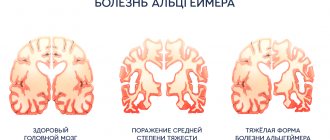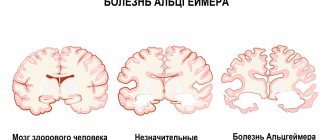Alzheimer's and Parkinson's diseases are two of the most common neurodegenerative pathologies affecting older people. In both cases, the nerve cells of the brain suffer, which, under the influence of unfavorable factors, begin to actively die. The death of neurons disrupts the normal functioning of the central nervous system, and a chronic irreversible process leads to human death.
Differences and common causes of senile neurological disorders
The nature of the origin of diseases from the moment of their discovery and description still remains a mystery. Scientists find it difficult to answer why abnormal protein formations suddenly begin to accumulate in brain tissue, damaging neurons and preventing the free transmission of nerve impulses. The difference between Alzheimer's and Parkinson's diseases regarding the mechanism of their occurrence is that the damage is caused to different parts of the brain. In senile marasmus, senile amyloid plaques disrupt the functioning of cells responsible for collecting and storing cognitive information, while in shaking palsy, the neurons that regulate motor skills take the brunt of the attack.
The difference between Parkinson's and Alzheimer's in pathogenesis does not exclude common probable provocateurs for the development of these diseases. These primarily include:
- age after 60-65 years;
- severe pathologies of the cardiovascular system, complications after stroke and heart attack;
- mechanical traumatic brain injury, brain tumors;
- professional activity and living in environmentally unfavorable conditions;
- genetic predisposition.
A difference between Alzheimer's and Parkinson's is also observed in gender distribution. Senile dementia affects mainly women, but parkinsonism is more often diagnosed in men. In addition, scientists have experimentally established that the risk of inheriting Alzheimer's increases with mutations in the APP and APOE 4 genes. Unlike Alzheimer's, genes potentially responsible for the occurrence of Parkinson's have not yet been found. According to doctors, the genetic failure is caused by a deficiency or absence of the hormone dopamine in the body. The early form of both diseases in 10% of all clinical cases can manifest itself at a fairly young age (up to 40 years).
Note. Unlike Alzheimer's, smoking is not a factor that accelerates brain degeneration in Parkinson's disease. There are 3 times fewer smokers with this diagnosis than people who are not subject to this bad habit.
Similarities of diseases
- Both belong to the group of neurodegenerative pathologies. This means that they develop due to the destruction of brain cells (neurons). These destructions are irreversible, and they will continue until the end of life.
- There are common provoking factors for the development of diseases, for example, old age, a history of traumatic brain injuries, heart and vascular diseases (hypertension, heart attacks), unfavorable ecology, and hereditary predisposition.
- Both are common among older people, but can also occur among younger people.
- There is no medicine that can cure both. But there are ways to slow the progression.
Differences in disease symptoms
Atrophy of different areas of the brain substance causes differences in the changes that occur in the behavior of people suffering from Parkinson's and Alzheimer's. The main sign of disturbances in the nervous system of dementors is a progressive deterioration in the functions of memory and thinking. Parkinsonism syndrome can be recognized by characteristic differences - movement disorders in the patient caused by overexcitation of the motor areas of the cerebral cortex.
Specific differences between Alzheimer's and Parkinson's diseases
| Alzheimer's disease | Parkinson's disease |
|
|
Parkinson's differs from Alzheimer's primarily in that mental and autonomic disorders come into the background after motor dysfunctions. Neurological disorders rarely affect the patient's intellect; depression, increased anxiety, insomnia, confusion, and chronic fatigue predominate.
The differences in the manifestation of senile dementia are obvious to the doctor: forgetfulness and confusion increasing over time, a distorted perception of reality, a decrease in the ability to clearly express one’s thoughts. Motor function in Alzheimer's begins to noticeably suffer in the severe stage of the disease, when the brain is no longer able to control the functioning of vital organs and systems. Muscular atrophy, complete immobility, exhaustion due to loss of the ability to eat independently become the main causes of severe complications ending in human death.
Reference. According to statistics, senile dementia occurs in every second person upon reaching 85 years of age. The similar figure for Parkinson's patients is much lower and ranges from 2 to 4%.
Differences
There are much more of them. Let's start with the fact that different brain cells are affected, hence the different symptoms. In Alzheimer's disease, neurons in the cerebral cortex are affected, and in Parkinson's disease, neurons that synthesize dopamine, the molecules of which are responsible for emotions and movements, are affected.
There is evidence that autopsies of patients who died from Parkinson's also reveal brain lesions (amyloid plaques) characteristic of Alzheimer's. But many doctors believe that it was a combined pathology, that is, the patients had two diseases at once.
Symptoms vary greatly. In Alzheimer's disease, memory is the first to suffer, followed by intelligence. It all starts with forgetfulness, which progresses over time - a person loses documents and things, and then they are found in strange places, forgets to pay bills and do everyday things. Then more serious symptoms appear:
- A person ceases to navigate in space, first in new places, and then in well-known ones, even in his own home.
- Social connections are lost - a person gets confused among familiar and close people. He forgets their faces and names or simply does not recognize them.
- Writing and counting skills are lost. Over time, speech function also suffers. A person cannot find words and forgets their meaning. Speech becomes scarce, extremely impoverished. In the final stages, only individual words or even sounds are spoken.
- Changes in the psyche and personality. His character changes, he becomes more hot-tempered and aggressive. Such people are overly suspicious, emotional and whiny. Depressed mood, even depression, may also be present. In the final stages, there is a complete collapse of the personality.
- In Parkinson's disease, muscle function is primarily affected. Most often it all starts with a trembling of one hand or head. During movement it decreases, and during sleep it disappears altogether. If a person is tired or nervous, the trembling intensifies.
Then the following symptoms appear:
- Muscle rigidity - they become stiff and unyielding. Patients can maintain the same position for hours. This condition is also called plastic waxy flexibility. If you try to straighten a limb, you will feel intermittent movements, as if a gear mechanism is working.
- Hypokinesia is a movement disorder. They become slow and seem to be delayed, this can be seen especially clearly in facial expressions.
- Unstable posture. When moving, the body seems to go ahead of the legs, no matter in which direction the person moves. This leads to a shift in the center of gravity. Patients find it difficult to start moving from a resting state and to stop if they move.
- A metabolic disorder that manifests itself as exhaustion or, conversely, obesity.
- Secretory disorders - greasiness of the skin and hair, increased salivation, and sweating are noted.
- Mental disorders are more characterized by psychosis, which is accompanied by insomnia, fear, hallucinations, and paranoid symptoms. Dementia is not so pronounced.
There are also differences in the prognosis of the disease. Parkinson's disease progresses more favorably. Symptoms can be controlled, and in the early stages of the disease, progression can be prevented with special medications and even surgical treatments. In particular, minimally invasive brain surgery, such as neurostimulation, can be used.
There is no effective treatment or control for Alzheimer's disease. You can only slightly slow down the deterioration of memory and impairment of mental abilities.
Differences in diagnosis and treatment methods
Parkinson's disease differs from Alzheimer's disease in the current diagnostic methods. A standard instrumental examination using computed tomography and magnetic resonance imaging will show the condition of tissues and blood vessels, and will also exclude the presence of other pathologies that occur with similar symptoms. To assess both motor and cognitive impairments, doctors use specially developed scales and test exercises.
Shaking paralysis develops when, under the influence of protein deposits, 60-80% of neurons in the substantia nigra of the brain, which is part of the extrapyramidal system, are killed, and the pronounced clinical picture clearly indicates the neurodegenerative nature of the pathology. Unlike Alzheimer's, the use of medications is effective in treating Parkinson's disease in the initial stages. They stimulate the production of the missing dopamine in the nervous system and thereby slow down the process of loss of motor function. Further therapy is aimed at alleviating symptoms and alleviating the patient’s condition.
Late diagnosis of senile dementia occurs due to attribution of memory problems to natural age-related changes, and outwardly the dementor looks like a completely healthy person for a long time. There is no medicine that can prevent or slow down the death of nerve cells. To some extent, it is possible to compensate for the death of neurons by taking drugs that prevent the destruction of acetylcholine. Only properly organized care and understanding on the part of loved ones of the nature of the disease can help the patient.
Due to the fact that the cause of diseases is still unknown, it is impossible to guarantee protection against their occurrence. General recommendations regarding feasible preventive measures include:
- timely treatment of pathologies that represent a risk factor;
- increasing immunity;
- maintaining a healthy lifestyle;
- compliance with the motor regime.
It is difficult to answer the question of why Parkinson's is better than Alzheimer's. Illnesses beyond the control of modern medicine inexorably lead to death. The significant difference between the diseases is that parkinsonism preserves a person’s personal qualities, which are mercilessly erased by senile dementia. This feature reduces the psycho-emotional burden that family members caring for a relative with dementia are forced to experience.
Etiology
To compare Parkinson's and Alzheimer's diseases, it is necessary to understand the mechanism of their occurrence and the principle of development. Both pathologies are neurological in nature – the victim’s brain is affected. Diseases in the vast majority of cases are registered in older people. They have a chronic course, characterized by slow progression with a gradual increase in the clinical picture.
Parkinson's and Alzheimer's occur against the background of degenerative processes in the tissues of the central nervous system. This leads to the death of cell colonies, atrophy of entire areas of the brain, and a decrease in the functionality of the organ. In Parkinson's, the death of neurons responsible for the synthesis of the neurotransmitter dopamine is recorded. A deficiency of the chemical compound contributes to irritation of the cerebral cortex by the basal ganglia, which leads to a number of characteristic symptoms.
Alzheimer's, according to the main theories, is the result of the accumulation of neurofibrillary tangles and amyloid plaques in the brain tissue. This triggers a sequence of degenerative changes in the tissues of the central nervous system. The resulting massive death of neurons and structural damage to cell colonies appear only several years after the start of the process.
What is the difference between Alzheimer's and Parkinson's?
In the first case, a person dies a slow death if proper medical support is not provided. The disease is classified as dangerous and incurable. Parkinson's disease has a better prognosis, its course can be slowed down, and the progression of symptoms can be completely reduced to zero. It is important to distinguish between these two ailments, because an incorrect diagnosis can cost health or even life.
Despite the severity of symptoms and poor prognosis, proper nutrition and an established daily routine can eliminate excessive limb tremors and confusion. Indeed, during stress and nervous situations, the resources of the central nervous system are consumed faster than they are replenished. Their deficiency leads to a chronic unstable condition, which is caused by overstrain of the whole organism. During the course of both ailments described in this article, the same thing happens, and even on an increased scale.
Therefore, it is very important to follow these recommendations:
- sleep at least 7 hours a day (you should go to bed in the evening, not late at night);
- eat properly and regularly, because a chaotic diet, lack of food is the same stress and burden on the body;
- avoid stress and conflict situations;
- do not consume alcohol and tobacco products.
Light physical activity will only be beneficial. Hiking, swimming pool, aerobics, yoga - all this will help put the body in order and normalize metabolic processes.
There are no other treatment methods available today. But if the disease cannot be completely eliminated, this does not mean that the patient’s standard of living cannot be at the proper level.
Comparison of vascular dementia and Alzheimer's disease
The cause of vascular dementia is heart attack, stroke, heart defects, diabetes mellitus, coronary heart disease and other factors. Vascular dementia can develop after an acute process or develop gradually due to slow blood circulation in the brain.
It has been proven that with constant mental training and physical activity, the likelihood of Alzheimer's disease is reduced. The emotional state, the presence of stressful situations, and heredity play a major role in the development of the disease.
It is often difficult for doctors to determine what type of dementia a patient has, since a mixed type of disease is diagnosed, when Alzheimer's dementia accompanies vascular dementia. A complete diagnostic study allows you to prescribe adequate treatment for the patient. The equipment of the Yusupov Hospital meets world quality standards. Studies using modern equipment and laboratory tests make it possible to determine the type of dementia, the state of the patient’s brain, and the severity of the disease. Competent diagnosis helps the neurologist choose the right direction of treatment for the patient and alleviate his condition.
Survival prognosis
Despite the significant differences between the diseases, the prognosis in both cases is unfavorable. There is no cure for these pathologies that can completely stop the degenerative process. Existing medications and other approaches only slow down the speed of its spread, prolonging the patient’s life and increasing its quality. On average, people with Alzheimer's disease live 7-9 years after diagnosis, subject to specialized therapy. With Parkinson's, with an adequate approach, patients live about 15 years, but at the same time their performance decreases noticeably after 8-10 years from the moment of diagnosis.
Knowing the difference between Parkinson's disease and Alzheimer's syndrome can help people notice warning signs early. The main thing is not to try to cope with them on your own, but to immediately contact a neurologist. Timely initiation of therapy against such a background becomes the key to the most favorable prognosis.
Alzheimer's dementia
AD is a condition in which cognitive skills are slowly but irreversibly destroyed. The victim eventually becomes unable to do even simple things and requires complete care.
To diagnose AD, two or three areas of cognition must be clearly abnormal, such as memory, language, disorganization, and disorientation.
The brains of such people show characteristic plaques of a protein called beta-amyloid and tangles of a neurofibrillary protein called tau. A new method of live brain imaging using PET scans using an amyloid-binding tracer is helping to detect these abnormalities in the brain and more accurately diagnose AD. However, it is only slightly more accurate than the traditional clinical diagnostic method and is intended for patients with atypical blood pressure.
Difference between diseases
When diagnosing various types of dementia and Alzheimer's disease, the differences between these pathological disorders make it possible to differentiate the diseases and prescribe adequate treatment to the patient. Dementia is often a comorbidity of Parkinson's disease. Dementia accompanies Alzheimer's disease.
The difference between Alzheimer's disease and dementia is that Alzheimer's disease always leads to dementia (senile dementia), but dementia is not always caused by Alzheimer's disease - there are a number of other factors and causes that cause dementia.
What are the similarities between the diseases?
Parkinson's and Alzheimer's have many similarities, which makes diagnosis difficult. Even a neurologist is often unable to distinguish neurological diseases at the initial stage of development without special measures. Sometimes the early stage of the clinical form of pathologies is so blurred that the patient himself and his relatives do not even suspect the presence of a problem. They explain the alarming signs by old age, overwork, stress, non-compliance with the daily routine, and “age-related” chronic diseases.
Read also: Causes of Alzheimer's disease, its stages and treatment methods
Parkinson's disease and Alzheimer's syndrome share the following similar characteristics:
- Vivid symptoms mainly develop in old age. In the case of Parkinson's, this is 55-60 years old, Alzheimer's appears after 65 years;
- chronic conditions, slowly progressing;
- often both pathologies begin with the same symptoms: headaches, fatigue, decreased attention, poor coordination, dizziness;
- The prognosis in both cases is unfavorable due to the fact that neither condition can be completely cured. With Parkinson's disease, the chances of stable, long-term remission are still higher than with Alzheimer's;
- both diseases are believed to have a hereditary predisposition. The genetic factor does not become the cause of the pathology itself, but it greatly increases the likelihood of its occurrence.
Often both pathologies begin with the same symptoms, one of them is headaches.
The mechanisms of development of degenerative processes are different. The causes of diseases are still being researched; there are several reliable theories. At the same time, doctors note similar risk factors, the influence of which on the body contributes to the triggering of reactions in the brain tissues, leading to changes in their structure.
What is Parkinson's disease?
Parkinson's disease is a degenerative disorder that affects the central nervous system and lymphatic system. The disease progresses at tremendous speed. The symptoms of the disease were described by the doctor D. Parkinson in 1877. Then he described the disease as a paralytic tremor. This is due to the fact that the main signs of damage to the central nervous system are expressed in trembling of the limbs, muscle tightening and inhibition of movements.
Statistics say that the disease occurs in 0.5% of the population over 45 years of age. Patients over 65 years of age are more likely to experience this disease in approximately 5% of cases. Parkinson's disease affects 1% of the world's elderly population under 60 years of age. Children very rarely get sick. Men are more often susceptible to this disease than women.
The life expectancy of a person suffering from Parkinson's disease, according to the first studies conducted in Japan, is approximately 7 years.
Factors influencing the course of the disease:
- timely therapy
- Lifestyle;
- proper patient care;
- regular diagnostics and correction of the treatment process.
IMPORTANT! Current research suggests that more and more patients around the world are affected by this disease, but it is possible to stop its progression.
A number of scientists have come to the conclusion that if the disease was detected at a young age, then life expectancy is not reduced. Research conducted in Britain found that the disease can be alleviated with the right lifestyle and following doctor's recommendations.
Symptoms of the disease:
- trembling in the limbs;
- panic attacks;
- chronic anxiety;
- apathy;
- depression;
- impaired salivation and urination.










